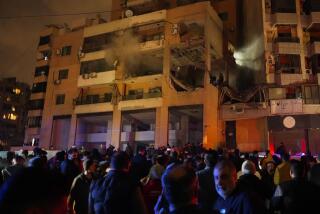Under siege in Damascus
- Share via
SYRIAN PRESIDENT BASHAR ASSAD should be having nightmares now, thanks to last week’s claim by his former vice president that Assad threatened former Lebanese Prime Minister Rafik Hariri months before Hariri was assassinated. The mounting evidence of top-level Syrian involvement in the murder also should trouble Assad’s friends in Russia -- the ones he relies on to stop any United Nations sanctions against his regime.
Abdel-Halim Khaddam served Assad’s father, Hafez, for decades and was an architect of Syria’s virtual takeover of Lebanon after the civil war there -- Syrian troops went to Lebanon in 1976 and stayed until last year, when the international outcry over the Feb. 14 assassination of Hariri forced their withdrawal.
Khaddam told the Al Arabiya television channel that Bashar Assad warned Hariri “in extremely harsh words” not to interfere with Assad’s plan to extend the term of Emile Lahoud as Lebanon’s president. Syrian officials, including Assad, have denied involvement in Hariri’s killing, and as soon as Khaddam’s claims became known, the ruling Baath Party expelled him and called him a traitor. He has been in exile in Paris for months.
A special United Nations investigator has foiled Damascus’ attempts to distance the government from Hariri’s killing. Detlev Mehlis reported last month that “high-ranked Syrian officers” were involved in the murder; he also accused Assad of blocking the probe. On the day Mehlis’ report was released, another Lebanese politician, newspaper publisher Gibran Tueni, was killed by a car bomb.
Khaddam’s claims spurred U.N. investigators to renew their request to interview Assad and Syria’s foreign minister, Farouk Shareh. The former vice president did not accuse Assad of ordering Hariri’s assassination but said it could not have been done without the president’s knowledge. That’s ample justification for a tougher stance by the international community. If Assad continues to stonewall investigators, the U.N. should impose sanctions on Syria. China and Russia have veto power over sanctions, and both are reluctant to take such drastic action.
Moscow, as a longtime ally of Syria, is a particularly difficult stumbling block. But Russia needs to understand the concerns of neighboring nations such as Egypt, whose president, Hosni Mubarak, spent much time discussing Syria in his meetings Tuesday with Saudi Arabian King Abdullah and Wednesday with French President Jacques Chirac in Paris.
Lebanon’s unity remains fragile, with different religions and ethnic groups contending for power. The Security Council has an obligation to see that investigators determine responsibility for Hariri’s killing -- and Tueni’s as well, if possible -- and if necessary to impose sanctions, its toughest weapon.
More to Read
Sign up for Essential California
The most important California stories and recommendations in your inbox every morning.
You may occasionally receive promotional content from the Los Angeles Times.













